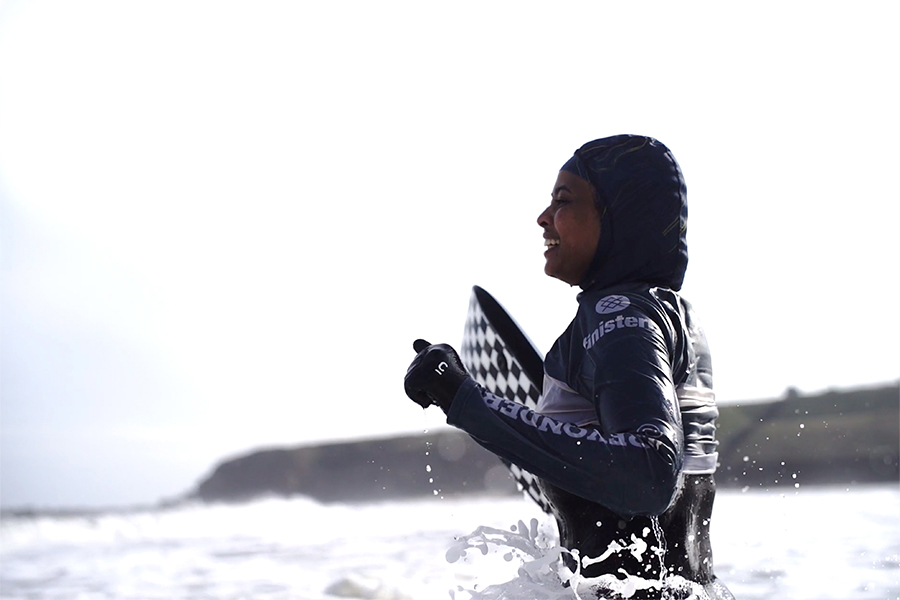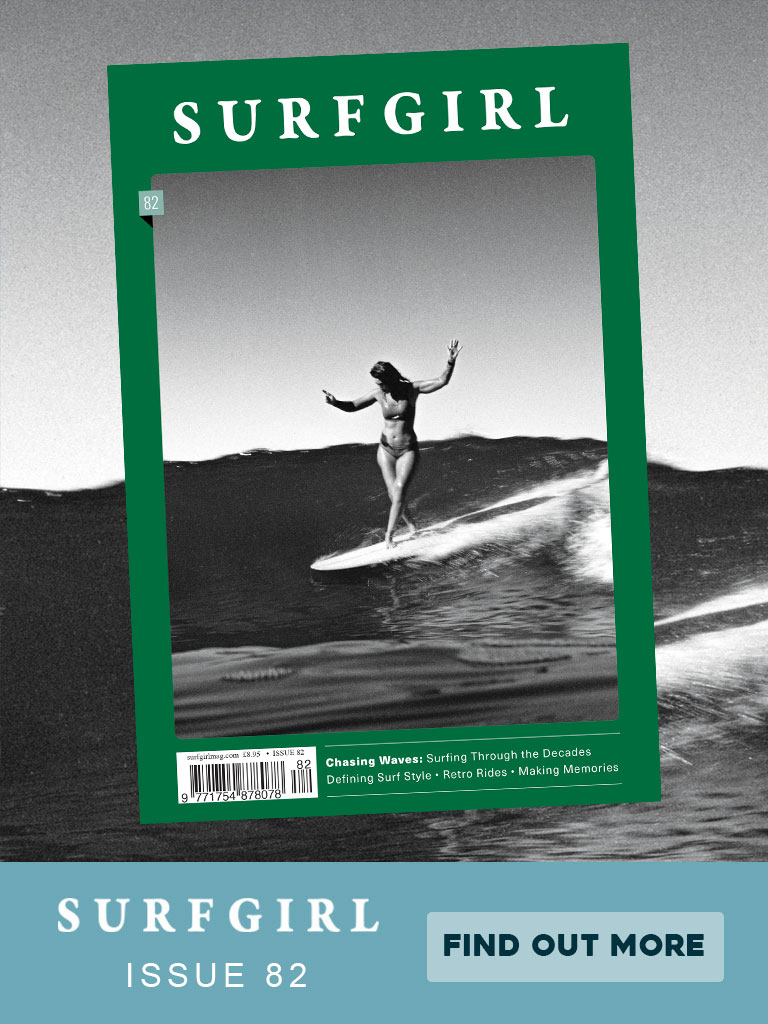We have a chat with Sally McGee who runs Yonder Surf Academy to find out more about her aim to get refugee girls surfing and how we can help with her project.

Sally, what inspired you to set up this surf project specifically for refugee girls?
To be honest setting up this project feels a little like coming full circle. Before I was a surf coach and before establishing Yonder (a women’s surf initiative in the North East of England), I worked pretty intensely within the Refugee sector. I started as a project advisor for the Refugee Council and went on to be a service coordinator at the British Red Cross. Both roles involved working on the front line with some of the most vulnerable and excluded people in our society. You can only try to imagine the levels of trauma, isolation and social exclusion that many of those I worked with faced. To leave everything you know behind due to conflict and persecution and to try and start a new life is hard enough, add to this extensive legal processes, homelessness, poverty and ever present media hostility. If I’m going to be completely honest, although I found this work deeply rewarding I was often left feeling helpless and frustrated, as the barriers to support were immense.
During this time surfing was a real comfort to me. Work for most of us can be all consuming and hard to switch off from, my work life balance at the time was definitely an unhealthy one but surfing was the one thing that allowed the cogs to stop turning. Over the years it has given me so much, it balanced my mental health back then and to this day it continues to provide me with friends, experiences and is the vehicle that connects me to the natural world. For me, it’s an absolute no-brainer that the act of surfing and simply being in the sea could have immeasurable benefits to people that find themselves displaced and isolated.
Now, 12 years on since leaving my role at the British Red Cross, I’m in a unique position to be able to do this. As Yonder became more established we were able to set up the charity arm ‘Yonder Surf Academy CIC’ and the first thing we did was contact our local refugee support services and offered them a five day surf course over the summer holidays. Luckily for us, project coordinator Bridget Stratford is a total legend with the most wonderful rapport with the young people she works with, the girls who joined us absolutely loved the experience and Bridget claimed it had been, “one of the most incredible experiences we have ever done with the young people.” It’s not always easy to engage teenage girls in activities like surfing so to be able to recruit a group of girls that came to every single session was testimony to her too. Going forward we will be working with Bridget at Action Foundation.
The North Sea and North East coastline is an amazing natural resource for all the people in the North East. Through removing barriers to participation we aim to build a more diverse coastal community that is fully representative of those who live in the North East.

What can you tell us about the project?
Over 12 months we will deliver regular surf, skate and sea swimming sessions, for up to eight refugee girls at a time who have been referred by our partner agency, Action Foundation. The pledges we receive will fund the cost of qualified and fully insured surf and skate coaches, travel expenses to help participants access the service and high quality & culturally appropriate equipment specifically for Solace Surf Club. Our specialist support will meet the individual needs of participants, many of whom struggle with anxiety and trauma to ensure they feel safe, nurtured and welcomed.
Each session will connect the girls to the natural environment as a means of therapy both mentally and physically. A team of six volunteers from the local community will be recruited to assist during sessions (three at any one time) and provide a friendly first link with the wider coastal community. This social connection will be further developed through an accompanying programme of community activity, open to all and including events such as beach cleans and film screenings.

In what ways do you think learning to surf will empower these girls beyond just physical activity?
We are seeing surfing as the vehicle to so many other things. Seeing these young women connect with their environment, stepping out of their comfort zone, challenging themselves, finding escape, submitting to nature and experiencing what their new home has to offer is an incredible win. In some cases, the reality might be that the last time they faced a body of water was an extremely traumatic time in their lives. In that respect; there is no more benefit to them learning to stand up than there is to putting their trust in us, saying yes, feeling empowered, simply splashing in the sea, bodysurfing or riding some waves into the shore on their stomachs.
“Amongst the group we had children who had experienced physical and emotional abuse, children who were young carers, children living in significant poverty and children in the midst of legal asylum processes. They were all under significant stress as well as having all of the normal difficult experiences which teenagers face. To have a few hours of freedom and fun was exactly what the girls needed. The focused nature of the session acted in a way as a mindfulness session with the girls listening and learning with an eagerness to progress and the hands on, relaxed style meant that all of the girls regardless of sporting ability or experience felt comfortable and confident to have a go.” Bridget Stratford Action Foundation.

Once you get it off the ground, what will be the main challenges facing both instructors and refugees and how will they overcome this?
We are really fortunate to be working alongside Action Foundation, they have a great relationship with their service users and will support the girls to get to the sessions each week. Action Foundation also does lots of work behind the scenes providing a wraparound service supporting any additional needs outside of surfing. As for the practicalities and realities during the sessions, we know from experience that wearing wetsuits and feeling uncomfortable can often be a barrier for anyone starting out surfing. Having clean, dry wetsuits, rash vests and culturally appropriate equipment such as sea hijabs for those that want them are all important, they immediately break down potential barriers. There will often be language barriers and some of the girls come with additional needs. Having an awareness and understanding of this and being able to pivot with a relaxed teaching style will be key.
All our volunteers will receive cultural competency and context training from Action Foundation. I will personally coach all the surf sessions and have years of training and experience in both fields which really does set us up well. I think importantly as an instructor it will be about making sure the programme is participant led, having an emphasis on play and never taking for granted the simple experience of being in the sea and its benefits. Some girls will want as much coaching as I can offer, others will want to set the boards aside and dive through waves, some may need to take a minute to slowly become familiar with the unfamiliar, patience, understanding and inclusivity will be key.

What support is essential to make this project happen?
Obviously there is the financial support, but the unique thing about this Crowdfunder is that it will hopefully be supported in a large part by a big public body (due to the election period we are not allowed to say who that will be at the minute) however In order for this body to see value in the project; they want to see public support through the Crowdfunder page. Any donation made allows donors to comment and say what they think of the project so donations can be big or small but importantly the opportunity to gather comments from the public is really unique and one that we hope will boost our chances of success.
It feels like a pretty dark time politically at home and abroad currently and these girls and their families who are following along will see the levels of support for the project from our community; already a day in and we are so grateful to those that have donated and left comments it feels like a huge benefit before the project has started.
Even the fact that you are letting us talk about the project in this way and giving us a platform is really valuable; it helps to push the way the surfing community is viewed.

What are your long term goals for the project?
We’ve been running the Yonder Surf Academy CIC alongside Yonder for the past four years, so are in a really great position to do joint bids with partner charities and to continue to fundraise to be able to use surfing and coastal access as a force for positivity in our area through what we do.
It is my hope that Solace Surf Club is here to stay and will go from strength to strength bringing the community together to celebrate the diversity and benefits of surfing. Legacy wise I do think that here in Newcastle we are in a unique position in that the inner city is so close to the coast that it isn’t unreasonable to imagine a world were these girls can continue to access the sea outside of Yonder but we need to start breaking down the barriers now whilst building the frameworks needed to enable that in the future, slowly and with community support.

What does the future look like for the girls involved in the surf project and how do you hope it will impact their lives?
Marine social scientist and surfer Dr Easkey Britton and colleagues recently wrote a paper on the benefits of surfing for refugee youth and she shared it with me yesterday. She writes, ‘The sea, by its unpredictable, ever-changing nature will always have an element of unfamiliarity. In the face of an uncertain future and far from the familiarity of their former homes, our findings highlight the resilience-building and wellbeing-enhancing qualities of the sea and surfing for the young asylum seekers.’
For many of these girls, the future is uncertain, a life of legal cases, rejected asylum claims, detention centres, relocations, substandard accommodation, levels of poverty that nobody in our society should face. It is rare for someone to be a refugee without facing varying degrees of trauma and loss along the way. What we can be certain of is the wonderful support they receive from Action Foundation, the friends and connections that they will make through the shared experience of surfing each week together and at the very least we hope to offer the opportunity for these young people to be just that, kids again.

Where can people go to support your project?
Right now there is one main place and it’s our Crowdfunder page. We are asking people to donate (no matter how small, every donation counts) and importantly leave a comment of support. We will find out by mid May if the Crowdfunder has been a success. We would also love it if people shared amongst friends, family and colleagues.
To follow along the best place is @surfyonder




